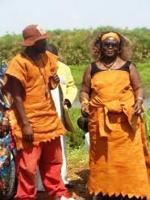Kisii Town People
Do you want to know the tradition culture of Kisii Town People?
Remember Kenya and its people in particular; follow their customs and traditional beliefs.
On this page therefore, allow me to take you into the introduction about people and culture of Kisii Residents.
History
Kisii town is originally known by the Gusii community as 'Bosongo'. It is believed to have originated from 'Abasongo' (to mean the White people or Whites) who lived in the town during the colonial times. The town was originally established by British soldiers who were being forced to retreat from Lake Victoria by heavy gunfire from German soldiers' gunboats during the Great War in the early 20th
Demographics
The town is predominantly inhabited by the Gusii community. The Gusii community, also known as the Kisii tribe, are East Africans of Bantu African genealogy and language origin commonly inhabiting the central and eastern sub-Saharan Africa.
The Kikuyu, Luhyia and Swahili represented in this town also shares the same Bantu classification with the Gusii community.
Moreover, due to municipality's diverse population, there are other Kenyan inhabitants who are Nilotic such as the Luo, Maasai and Kalenjin; Cushitic communities such as Somali and Boran working or doing business in town.
Lastly, there are Kenyans of Asian origin such as Arab, Indian and Pakistani as well as European, North American or East African mainly representing Christian mission staff, working with the NGO community based in the municipality or operating in Gusiiland or South Nyanza.
More about People and Culture in Kisii District
• The Great Rift Valley is thought to be one of the places where human beingsoriginated, and archeologists working in the valley have found remains of what they speculate are some of the earliest human ancestors.
Kenya Culture and Food in Daily Life .
• Corn (or maize) is the staple food of Kenyans. It is ground into flour and prepared as a porridge called posho, which is sometimes mixed with mashed beans, potatoes, and vegetables, to make a dish called irio.
• Boiled greens, called mboga, are a common side dish. Banana porridge, called matoke, is another common dish.
• Kenya Culture and the Relative Status of Men and Women .
• For the most part, women are treated as second-class citizens in Kenya. Despite the disproportionate amount of work that women do, men usually control the money and property in a family.
• Wife beating is common, and women have little legal recourse. Another women's issue is clitoridectomy, or female genital mutilation, which leaves many women in continual pain and vulnerable to infection.
Kenya Culture on Marriage . Polygamy is traditional, and in the past it was not uncommon for men to have five or six wives.
The practice is becoming less typical today as it has been opposed by Christian missionaries, and is increasingly impractical as few men can afford to support multiple partners.
Kenya Culture on Domestic Unit .
In the traditional living arrangement, a man builds a separate hut for each of his wives, where she will live with her children, and a hut for himself.
In a family with one wife, the parents often live together with girls and younger boys, while the older boys have smaller houses close by.
Kenya Culture on Inheritance . According to the tradition, inheritance passes from father to son. This is still the case today, and there are legal as well as cultural obstacles to women inheriting property.
Kenya Culture on Infant Care . Mothers usually tie their babies to their backs with a cloth sling. Girls begin caring for younger siblings at a very early age, and it is not uncommon to see a five- or six-year-old girl caring for a baby.
Kenya Culture on Child Rearing and Education . Child rearing is communal: responsibility for the children is shared among aunts, uncles, grandparents, and other members of the community. Boys and girls have fairly separate upbringings.
Kenya Culture on Etiquette Kenyans are generally friendly and hospitable. Greetings are an important social interaction, and often include inquiries about health and family members. Visitors to a home are usually offered food or tea, and it is considered impolite to decline. Elderly people are treated with a great deal of respect and deference.
Do you have anything to say about people and culture of Kisii people in Kenya?
If you are a resident of Kisii City, you must be having full information on the culture of these people.
If you can write any information about Kisii , I will be happy to add your page on my site for free. Don’t forget the pictures.
Recent Articles
-
Garam Masala Appetizers ,How to Make Garam Masala,Kenya Cuisines
Sep 21, 14 03:38 PM
Garam Masala Appetizers are originally Indian food but of recent, many Kenyans use it. Therefore, on this site, we will guide you on how to make it easily. -
The Details of the Baruuli-Banyara People and their Culture in Uganda
Sep 03, 14 12:32 AM
The Baruuli-Banyala are a people of Central Uganda who generally live near the Nile River-Lake Kyoga basin. -
Guide to Nubi People and their Culture in Kenya and Uganda
Sep 03, 14 12:24 AM
The Nubians consist of seven non-Arab Muslim tribes which originated in the Nubia region, an area between Aswan in southern







New! Comments
Have your say about what you just read! Leave me a comment in the box below.